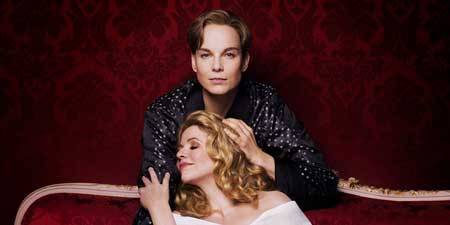Opera (1911)
Music by Richard Strauss
Libretto by Hugo von Hofmannsthal
Conductor: Sebastian Weigle
Production: Robert Carsen
Metropolitan Opera, New York, NY
Live in HD
With Renée Fleming (The Marschallin), Erin Morley (Sophie), Elīna Garanča (Octavian), Matthew Polenzani (An Italian Singer), Markus Brück (Faninal), Günther Groissböck (Baron Ochs)

Elīna Garanča as Octavian
in “Der Rosenkavalier”
Photo: Metropolitan Opera, New York
The Marschallin (Renée Fleming) has had an affair with the much younger Octavian (Elīna Garanča) and clearly indicates that things are at an end. Sophie (Erin Morley), the daughter of Faninal (Markus Brück), is scheduled to marry the brutish Baron Ochs (Günther Groissböck) but she is so appalled by his behavior that she backs out. Meanwhile, she falls in love with Octavian, and a ruse, also involving The Marschallin, is conceived to dupe the Baron and to teach him a lesson.
The great soprano, Renée Fleming, now in her late fifties, has played The Marschallin in Der Rosenkavalier many dozens of times and has decided, after this run, to stop doing the role and to call it quits at least as far as Der Rosenkavalier is concerned. This was a last chance to see Fleming embody a role for which she has become widely known and to celebrate, as a result, her long and distinguished career. She certainly does not need to quit – her singing is still terrifically powerful and lyrical, but she has said that she feels it’s time to make a change.
As well, the wonderful Elīna Garanča who has had a long run in many venues as Octavian, the part in which she plays a young man who sometimes plays a woman, has decided to move on from Octavian. She is generally at a much earlier stage of her career than Fleming, but feels, as well, that she needs to do other things.
In any case, it was wonderful to hear these two magnificent voices – Fleming, a soprano, and Garanča, a mezzo-soprano – in this last rare opportunity.
Joining them in the resounding trio of the third act, was Erin Morley as Sophie; the result was robust, richly lyrical and deeply rewarding.
The newly designed production for the Metropolitan Opera was done by Robert Carsen. Its lush design sets the opera at the time of its actual premiere, around 1911, which turns out to be a pretty effective choice, situating it at the turn of the century and at the cusp of the Modernist era.
Richard Strauss is by most accounts a late Romantic composer, but there are definitely moments when the Romantic landscapes are punctuated by odd tweets and flourishes that signal a turn towards Modernist atonality. Though they are familiar elements of the score, one notices them with a returning surprise. They are reminiscent, in some odd way, of flourishes that Puccini, a very differently oriented Romantic opera composer, uses at various times, signaling as well his verging on the cusp of Modernism while holding fast to the Romantic modality.
The acting of these three female leads is very good and they are joined by a spectacular, and distinctive, acting and singing performance by Günther Groissböck who plays the awful and brutish Baron Ochs. His bass is rich and sonorous, but his acting, especially as conceived by Robert Carsen in this production, is distinctively good. He’s the bad guy, but he is a great bad guy, full of bluster and awful behavior that makes the role predominsntly comedic. Sophie and Octavian get to strut their stuff in response.
Hofmannsthal’s libretto is lively and Strauss’ music is lush and full, sweeping majestically from one scene to the next. The opera is almost five hours long, which seems attenuated for a comic opera about society people playing tricks on one another, but that seems to fit in well with the high German Romantic tradition. Wagner’s Die Meistersinger, which is basically about a song competition, goes on for an hour longer.
– BADMan
Leave a Reply